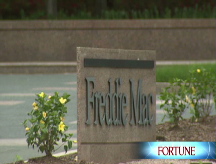Fannie, Freddie storm wallops insurers, too
It's not just regional banks feeling the effects of Treasury's takeover and the crash in the companies' preferred shares.
NEW YORK (Fortune) -- Regional banks aren't the only ones hurting from this weekend's government takeover of Fannie Mae and Freddie Mac. Some of the country's largest insurance companies are facing a massive headache too.
Hartford Financial Services Group, CNA Financial and a handful of other major publicly-traded insurance companies bought more than $4 billion of preferred shares of Fannie (FNM, Fortune 500) and Freddie (FRE, Fortune 500), according to a Goldman Sachs report and a review of the companies' regulatory filings.
When the Treasury Department seized Fannie and Freddie on Sunday - placing both companies in the equivalent of bankruptcy - it effectively halted dividend payouts of more than $30 billion to preferred stock holders, rendering their investments almost worthless.
Regional banks like Sovereign Bancorp (SOV, Fortune 500) were especially big holders of preferred shares, which pay a higher dividend than common stock and were generally thought to be safe investments before Fannie and Freddie began running into serious problems this spring. But some insurers are taking a beating too.
The devastation is best seen in the collapse of Fannie and Freddie's most recent sale of preferred stocks: the 8.75% mandatory and 8.25% series T convertible preferred securities issued in May. The 8.75% preferred closed Monday at about $1.45, down $16.11 from Friday's close of $17.56. The 8.25% dividend preferred closed Monday down more than $11, at $2.66, having closed Friday at $13.66.
Both securities won't make their first dividend payment, due Sept. 11.
The bloodbath isn't limited to the May preferred investors. Traders told Fortune.com that declines of 90% in price were the norm for other Fannie and Freddie preferred issues.
Insurers that are suffering run the gamut from mainstream behemoths like Hartford (HIG, Fortune 500) and CNA (CNA) to lower-profile players like W.R. Berkley.
Greenwich, Ct.-based W.R. Berkley (WRB, Fortune 500), for example, has $217 million in so-called government sponsored enterprise preferred stock on their books. This is about 4.9% of their post-tax tangible equity value, according to Goldman's insurance analysts. A W.R. Berkley spokeswoman declined comment.
Erie Indemnity (ERIE) of Erie, Pa., owns $96 million of the devalued paper, according to Goldman, which represents a sizable 6.4% of its post-tax tangible equity. A company spokeswoman did not return a call.
Hartford had about $488 million Fannie and Freddie preferred securities on its books, although with a nearly $20 billion market cap, the hit to shareholders is certainly minimal. A Hartford spokeswoman did not return an e-mail seeking comment.
CNA, meanwhile, held $268 million of preferred Fannie and Freddie stock, or 1.9% of its post-tax tangible equity. A CNA spokeswoman did not respond to a call seeking comment.
Of course, given the massive losses in the banking sector - which appears to own between $15 billion and $20 billion of preferred stock in Fannie and Freddie - all eyes have been on banks. Indeed, Treasury Secretary Henry Paulson acknowledged that certain banks with outsized positions (relative to their equity capital bases) may be forced to work with regulators to develop a plan to cope with the hit to their capital.
Monday afternoon, Wells Fargo (WFC, Fortune 500) became the first major bank to acknowledge its losses. In a statement, it said that it had $480 million in Fannie and Freddie preferred stock and that these positions are trading at "between 5% and 10% of their original value."
To be fair, Wells Fargo is in an enviable position, having avoided owning (or underwriting) much of the worst mortgage-related loans and securities.
The suspension of the Fannie Mae and Freddie Mac preferred dividend was also painful for hedge funds, some of which owned hundreds of millions dollars worth of these securities.
Depending on the hedge ratios - which is trader parlance for the amount of stock sold short to hedge the position - numerous convertible hedgers took a sizable hit, especially if they had a bullish bias and a lighter hedge. This is an unwelcome development given both the brutal performance of many hedge funds over the summer, as well as the convertible sector overall. ![]()
-
 The retail giant tops the Fortune 500 for the second year in a row. Who else made the list? More
The retail giant tops the Fortune 500 for the second year in a row. Who else made the list? More -
 This group of companies is all about social networking to connect with their customers. More
This group of companies is all about social networking to connect with their customers. More -
 The fight over the cholesterol medication is keeping a generic version from hitting the market. More
The fight over the cholesterol medication is keeping a generic version from hitting the market. More -
 Bin Laden may be dead, but the terrorist group he led doesn't need his money. More
Bin Laden may be dead, but the terrorist group he led doesn't need his money. More -
 U.S. real estate might be a mess, but in other parts of the world, home prices are jumping. More
U.S. real estate might be a mess, but in other parts of the world, home prices are jumping. More -
 Libya's output is a fraction of global production, but it's crucial to the nation's economy. More
Libya's output is a fraction of global production, but it's crucial to the nation's economy. More -
 Once rates start to rise, things could get ugly fast for our neighbors to the north. More
Once rates start to rise, things could get ugly fast for our neighbors to the north. More













